2405AFC020224 – Good hopes for Better ← 😊 PODCAST LINK
Read it online here, please. And please – when you visit there – use one of the social media links at the bottom of the page to share this post. Thank you! And remember, we now have a READER VIEW available, so share this link or this email often. Do you know someone who enjoys Bible study, or who might like to read this? Ask them to email us or to subscribe on our blog-site.
 Job 7:6-7, 16-19 –
Job 7:6-7, 16-19 –
6 My days are swifter than a weaver’s shuttle,
and come to their end without hope.
7 “Remember that my life is a breath;
my eye will never again see good.
16 I loathe my life; I would not live forever.
Let me alone, for my days are a breath.
17 What are human beings, that you make so much of them,
that you set your mind on them,
18 visit them every morning,
test them every moment?
19 Will you not look away from me for a while,
let me alone until I swallow my spittle?
E pili mau na pomaika‘i ia ‘oe a me ke akua ho’omaika’i ‘oe, ʻōmea! (May blessing always be with you and may God bless you, Beloved!) This weekend we will be hearing a passage from the Book of Job. This is a very ancient piece of literature, probably composed around 2500 B.C. – and many believe it came into being even earlier than that in the 7th, 6th, or 4th centuries B.C. The passage above is from the Judeo-Christian Tradition, but there is also a so-called “Babylonian Job” called The Ludlul-Bel-Nimeqi. There are a few similarities, but generally the two are quite different. The one thing they both have in common is the apparently unjust and horrific suffering of a genuinely righteous person. Both stories take up an old, old question: “Why must there be suffering?” Rabbi Harold Kushner took up the question again in 1978 with his book When Bad Things Happen to Good People. He concluded that basically God was not powerful enough to eliminate evil. We saw some time ago in Isaiah 59:1 See, the Lord’s hand is not too short to save, or his ear too dull to hear. He does have the power, and chooses not to use it. Still, suffering and evil are mysteries we deal with in our daily lives – daily lives. We can’t help but ask, “WHY?” This is an especially important question if the one suffering is us. At the outset we need to recognize that some suffering is a mystery meant to be offered lovingly to our Abba on behalf of others. The Apostle Paul had this to say: Colossians 1:24 – 24 I am now rejoicing in my sufferings for your sake, and in my flesh I am completing what is lacking in Christ’s afflictions for the sake of his body, that is, the church. This redemptive suffering is our participation in the sufferings of Christ, and can always be offered in the hope of better for all.
Many times this question takes the form of “Why is God doing this to me?” Another form is “How can a supposedly loving God allow this to happen?” I want to focus on those two questions first. “Why me” is rooted in the idea that God uses suffering as a punishment for evil. The Old Testament is often cited as a proof for this supposition, and superficial reading makes it appear God is old and vengeful. Perhaps the most elaborate construct of this idea is the conquering of Canaan by the Israelites. Think back to our lesson on Jonah (↔ Click Link). The Ninevites were a thoroughly evil people. God had it in mind to destroy them. Nonetheless he sent Jonah to warn them. The Ninevites repented and were spared – for a while. When they reverted to their evil ways, they were destroyed (click here for an insightful look into Nahum 3). Yet it took centuries of opportunities to change before their demise was accomplished.
The same was true for the inhabitants of Canaan. They too were thoroughly evil and had many opportunities to change. They did not. In fact, in the case of the Amorites God gave them roughly 450 years to get it together. My point is that we are not being punished. God is getting our attention by correcting us, by showing us the consequences of our choices to be stubborn and selfish. In the book of Proverbs we read at Proverbs 3:12 – For the LORD corrects those he loves, just as a father corrects a child in whom he delights. (New Living Translation). Paul cites this passage in Hebrews 12:6-7 – “… for the Lord disciplines those whom he loves, and chastises every child whom he accepts. Endure trials for the sake of discipline. God is treating you as children; for what child is there whom a parent does not discipline?” We are given an opportunity to change. We can choose to do so because we have free will.
Sometimes, though, it is true that the things that happen to us are not our fault. They are not God’s fault either. Sometimes something painful happens so that something better replaces it. In his book, A Grief Observed, C. S. Lewis wrote, “What do people mean when they say, ‘I am not afraid of God because I know He is good’? Have they never even been to a dentist?” He continues with more examples: Have you ever had a broken bone that had to be reset by a doctor? Have you ever seen a marble sculpture? Sometimes painful things result in better things. Sometimes the things that hurt make us better in the long run. We have to look beyond the hurt and accept that good comes from it. Here are some additional insights from The Apostle Paul:
Romans 8:18 – I consider that the sufferings of this present time are not worth comparing with the glory about to be revealed to us.
2 Corinthians 4:16-18 – So we do not lose heart. Even though our outer nature is wasting away, our inner nature is being renewed day by day. For this slight momentary affliction is preparing us for an eternal weight of glory beyond all measure, because we look not at what can be seen but at what cannot be seen; for what can be seen is temporary, but what cannot be seen is eternal.
Romans 8:28 – We know that all things work together for good (↔ Music Link) for those who love God, who are called according to his purpose. Another way to say that is in all things God works for Good. “Eat your spinach. It’s good for you!” may seem like suffering at the time, but it’s nothing compared to having a healthy body which comes from healthy eating.
Sometimes the suffering we have to endure comes from the way others have treated us. There’s no denying that there have been gaggles of parents who abused their children but claimed “it was only discipline.” The same goes for other interpersonal relationships – siblings, spouses, children, other relatives, elders, coworkers, supervisors, authority figures, or neighbors. We would be disingenuous to say that such abuse does not exist and does not seriously impact many lives. This reality is often the root of that second question,  “How can a supposedly loving God allow this to happen?” That question is especially relevant when innocents suffer at the hands of great evil as when parents murder their own children (especially when they are unborn children), or when sociopathic killers torture and murder people. One I see quite often these days relates to ISIS and Hamas and the horrific and egregious acts of terror they commit. How can people, in the name of a god (whom they call Allah), do those things? As I have said here before, these acts are committed by heretics, and Allah is not Jehovah. At some points in history just about every major religious – and even antireligious – group has committed atrocities. Whoever the perpetrators are, it is still atrocious, still evil, and still a choice. We are not commanded to annihilate the earthlings that are different from us. We are commanded to love and forgive them.
“How can a supposedly loving God allow this to happen?” That question is especially relevant when innocents suffer at the hands of great evil as when parents murder their own children (especially when they are unborn children), or when sociopathic killers torture and murder people. One I see quite often these days relates to ISIS and Hamas and the horrific and egregious acts of terror they commit. How can people, in the name of a god (whom they call Allah), do those things? As I have said here before, these acts are committed by heretics, and Allah is not Jehovah. At some points in history just about every major religious – and even antireligious – group has committed atrocities. Whoever the perpetrators are, it is still atrocious, still evil, and still a choice. We are not commanded to annihilate the earthlings that are different from us. We are commanded to love and forgive them.
Hebrews 12:15 – See to it that no one fails to obtain the grace of God; that no root of bitterness springs up and causes trouble, and through it many become defiled.
Ephesians 4:32 – and be kind to one another, tenderhearted, forgiving one another, as God in Christ has forgiven you.
1 John 1:8-10 says, 8 If we say that we have no sin, we deceive ourselves, and the truth is not in us. 9 If we confess our sins, he who is faithful and just will forgive us our sins and cleanse us from all unrighteousness. 10 If we say that we have not sinned, we make him a liar, and his word is not in us.
Matthew 6:14-15 – For if you forgive others their trespasses, your heavenly Father will also forgive you; but if you do not forgive others, neither will your Father forgive your trespasses.
Matthew 22:37-40 – He said to him, “‘You shall love the Lord your God with all your heart, and with all your soul, and with all your mind.’ This is the greatest and first commandment. And a second is like it: ‘You shall love your neighbor as yourself.’ On these two commandments hang all the law and the prophets.”
In 1 Thessalonians 5:12-22, Paul tells us to be at peace with all men, return good for evil (not evil for evil), to take care of the weak and be patient with everyone (not only others, but ourselves as well), to pray without ceasing and “in everything give thanks,” so as not to quench the Spirit, and to abstain from all appearance (and practice) of evil. That’s a pretty tall order! Yet throughout the entirety of our Bible, God tells us to love him and each other.
So, does “love your neighbor” mean we complacently allow these evil persons to perpetrate crimes against us? Of course not! We have a moral responsibility to combat evil. The Two Greatest Laws do not say “Do No Harm.” God’s Law says to put God and neighbor first and we are to follow the whole Law. One commandment (5th or 6th depending on how you number them) forbids intentionally destroying human life. Some argue that this forbids war. Yet there are times when the so-called “just-war doctrine” compels us to take a stand. In this question, too, the key consideration is that we have a 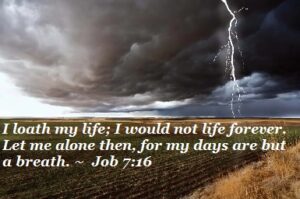 choice, and our choice should be guided by Christ’s Law of Love. Still, enduring evil and suffering – even if we do so within the guidelines of Scripture – is not easy, and we nevertheless want answers. Let’s return to Job and see how he was answered.
choice, and our choice should be guided by Christ’s Law of Love. Still, enduring evil and suffering – even if we do so within the guidelines of Scripture – is not easy, and we nevertheless want answers. Let’s return to Job and see how he was answered.
In the book of Job, God never tells Job why he was suffering. When we read the first part of the story of Job – Job 1:6-12 (← Read this) – we see that Satan – the Accuser הַשָּׂטָ֖ן ha-Satan {häś·śä·ṭän} – obtains permission to demonstrate his belief that Job is a good and upright man only because God has surrounded Job with divine protection. Equally important in the story, Job consistently denies that the reason for his suffering is his sin. In answer, God comes down in a whirlwind and asks Job dozens of questions, and all of them are unanswerable! See Job 38:1 – 42:6 (←FASCINATING READING!). God never tells Job to stop complaining, either; even though the suffering we looked at in the beginning of this essay is pretty harsh, God never said Job should stop. Job listens in silence and his response is also silence. He is humbled before God, and that is the posture we need to take when our lives seem to be only suffering, evil, and pain. We always have that choice to defer to him, to reverence him, to kneel in awe before him, and to surrender everything to him. What do I mean by everything?
By “everything” I mean whatever we have in our lives that is contrary to the Life God created in us. Can we and do we say “I hate!”? Then we have not surrendered that act of unlove to God. Do we and can we claim that God has given us more than our share of suffering and that none of it is the consequence of our own choices? God does not give us suffering. God does permit us to feel the consequences of separating ourselves from him in the hope that we will choose not to make that separation the choice we select for eternity after our resurrection. “Why is God doing this to me?” “How can a supposedly loving God allow this to happen?” “Why doesn’t God fix this/me/them?” We have seen that some of the heinous evil that brings great suffering is the consequence of the same free will which makes Love possible. We know that the end of our life on this Earth is not the end of everything, because we are created in the image of God and are therefore eternal beings. We know that God can (and will always) bring great good out of great evil – think of the stories of Joseph in the Old Testament and Jesus in the New Testament. God does not cause evil, he redeems evil. The bottom line is that suffering and evil – like salvation, creation, the trinity, and other Divine Mysteries – are things we just cannot understand. Whatever our appeal to God’s Mercy is, this one thing is clear about evil and suffering: It does not come from God. It comes from our fallen nature and is part of our journey back to the life God intends for us – eternal, sinless, and glorious just like him. We know this because we know God truly does understand our suffering. Look to the life, passion, death, and resurrection of his Only Begotten Son. There is Hope for our reunion! (↔ Music Link) Check out Sirach 40:26 (← Try it! You’ll like it!)
Belovéd, the suffering we are enduring now in Ukraine, Gaza, Nigeria, Darfur Province,  and tens-of-thousands (← IMPORTANT learning link!) of other locations look like a game of “Farmer In The Dell” compared to what the Assyrians in Nineveh did. Jonah had right reasons to fear them; nonetheless he accomplished God’s goal – albeit with much reluctance and pouting – and from that, not only was Nineveh so thoroughly destroyed so that even today we’re not sure where it was, but also God brought better things from the good he created by removing that evil. Today, there is yet another evil which flourishes in that area which is near and in the city of Mosul. That is near where ISIS made its last stand in 2022 before moving to Nigeria and Northern Mozambique. That may not seem good, but it IS better. Our work is not yet done. We must confront and destroy evil wherever we find it, even if it means a Just War. One other consideration previously reported here:
and tens-of-thousands (← IMPORTANT learning link!) of other locations look like a game of “Farmer In The Dell” compared to what the Assyrians in Nineveh did. Jonah had right reasons to fear them; nonetheless he accomplished God’s goal – albeit with much reluctance and pouting – and from that, not only was Nineveh so thoroughly destroyed so that even today we’re not sure where it was, but also God brought better things from the good he created by removing that evil. Today, there is yet another evil which flourishes in that area which is near and in the city of Mosul. That is near where ISIS made its last stand in 2022 before moving to Nigeria and Northern Mozambique. That may not seem good, but it IS better. Our work is not yet done. We must confront and destroy evil wherever we find it, even if it means a Just War. One other consideration previously reported here:
- The World population is around 1 BILLION (↔ Click Link)
- The number of persons who claim to be Muslim is around 2.1 BILLION, about 26% of the World’s population
- The estimated percentage of terroristically militant members is around 2% which comes to about 40,000,000 (FORTY-MILLION) willing to kill, maim, and torture non-Islamic entities. The 9/11 attacks were committed by 19 al-Qaeda terrorists.
Be humble before God. Seek justice, mercy, and obedience (↔ Music Link) instead of prejudice, persecution, and rebellion. For each of us, our perception of what is evil can be countered by our reception of all that is Good. Everything that is Good is of God, and God is always better than good. Therefore we must See to it that no one fails to obtain the grace of God; that no root of bitterness springs up and causes trouble, and through it many become defiled. Furthermore, and be kind to one another, tenderhearted, forgiving one another, as God in Christ has forgiven you. If all the available choices are evil, be the Good that changes that. Choose the Hope of Peace. (↔ Music Link)
Oh! And don’t forget to read Nahum 3 !! Whatever is Good (or even Best) can still be made Better through HOPE! It’s in the Absolutely Perfect Plan.
Whatever, whenever, wherever, whoever, however, if ever, forever —
at your service, Belovéd!
Please pray with us here at Share-a-Prayer.

Aloha Friday Messages by Charles O. Todd, III is licensed under a Creative Commons Attribution-ShareAlike 3.0 Unported License
Biblical languages inserts from Bible Hub (Bible Hub: Search, Read, Study the Bible in Many Languages) Visit at http://biblehub.com
Unless otherwise indicated, all scripture passages are from the New Revised Standard Version Catholic Edition (NRSVCE) New Revised Standard Version Bible: Catholic Edition, copyright © 1989, 1993 the Division of Christian Education of the National Council of the Churches of Christ in the United States of America. Used by permission. All rights reserved.







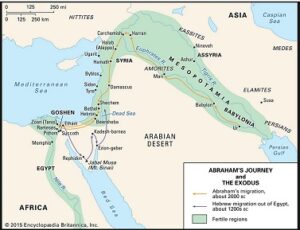 book of the Bible that many people never read, and those who do mostly skip through it. It’s full of rules, precepts, and laws about Ritual Sacrifices. It is the middle book of the Pentateuch, the first 5 books of the Torah and also of our Bible. It is called Leviticus because most of it deals with the tribe of the Levites who have the responsibility for the Priestly service for the Israelites. Honestly, the text really turns some people off. There’s a lot of blood, a lot of sacrificial slaughter, a lot more blood, and endless fire and smoke from the Altar. In addition, there are lots of “guidelines” (significant rules we would today call MYOB-rules) that are designed to guide a thoroughly idol-oriented, pantheistic aggregation of people who have been enslaved for 10 generations into a strong, monotheistic, and cohesive society that can stand on its own as a nation in the midst of really dreadful nations like the Assyrians, Philistines, and the Amalekites. On 21st century maps Assyria would be the region of northern Iraq, northwestern Iran, southeastern Turkey, and eastern Syria. Some people consider the descendants of the Amalekites and Philistines to be Palestinians because in the Bible, those nations vigorously opposed the seizure of Canaan as the Promised Land of the Hebrews. As we well know, that conflict is still raging after 3,300 years, and there’s only one end in sight: The Return of Christ at the End of the Age of the Church. I agree with The Apostle Paul who agreed with Jesus that the End of the Age could be any day now. I think it’s safe to state that that process will be pretty messy for anyone who is unprepared; but, prepared for what, and how?
book of the Bible that many people never read, and those who do mostly skip through it. It’s full of rules, precepts, and laws about Ritual Sacrifices. It is the middle book of the Pentateuch, the first 5 books of the Torah and also of our Bible. It is called Leviticus because most of it deals with the tribe of the Levites who have the responsibility for the Priestly service for the Israelites. Honestly, the text really turns some people off. There’s a lot of blood, a lot of sacrificial slaughter, a lot more blood, and endless fire and smoke from the Altar. In addition, there are lots of “guidelines” (significant rules we would today call MYOB-rules) that are designed to guide a thoroughly idol-oriented, pantheistic aggregation of people who have been enslaved for 10 generations into a strong, monotheistic, and cohesive society that can stand on its own as a nation in the midst of really dreadful nations like the Assyrians, Philistines, and the Amalekites. On 21st century maps Assyria would be the region of northern Iraq, northwestern Iran, southeastern Turkey, and eastern Syria. Some people consider the descendants of the Amalekites and Philistines to be Palestinians because in the Bible, those nations vigorously opposed the seizure of Canaan as the Promised Land of the Hebrews. As we well know, that conflict is still raging after 3,300 years, and there’s only one end in sight: The Return of Christ at the End of the Age of the Church. I agree with The Apostle Paul who agreed with Jesus that the End of the Age could be any day now. I think it’s safe to state that that process will be pretty messy for anyone who is unprepared; but, prepared for what, and how?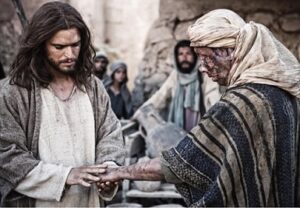 clean!” In that passage in the Gospel of Mark, Jesus is described as being “moved with compassion.” The
clean!” In that passage in the Gospel of Mark, Jesus is described as being “moved with compassion.” The  I said, “I will confess my transgressions to the Lord,” and you forgave the guilt of my sin. Selah When I hear that passage I think of the Pharisee and the Publican (See
I said, “I will confess my transgressions to the Lord,” and you forgave the guilt of my sin. Selah When I hear that passage I think of the Pharisee and the Publican (See 

 “How can a supposedly loving God allow this to happen?” That question is especially relevant when innocents suffer at the hands of great evil as when parents murder their own children (especially when they are unborn children), or when sociopathic killers torture and murder people. One I see quite often these days relates to ISIS and Hamas and the horrific and egregious acts of terror they commit. How can people, in the name of a god (whom they call Allah), do those things? As I have said here before, these acts are committed by heretics, and Allah is not Jehovah. At some points in history just about every major religious – and even antireligious – group has committed atrocities. Whoever the perpetrators are, it is still atrocious, still evil, and still a choice. We are not commanded to annihilate the earthlings that are different from us. We are commanded to love and forgive them.
“How can a supposedly loving God allow this to happen?” That question is especially relevant when innocents suffer at the hands of great evil as when parents murder their own children (especially when they are unborn children), or when sociopathic killers torture and murder people. One I see quite often these days relates to ISIS and Hamas and the horrific and egregious acts of terror they commit. How can people, in the name of a god (whom they call Allah), do those things? As I have said here before, these acts are committed by heretics, and Allah is not Jehovah. At some points in history just about every major religious – and even antireligious – group has committed atrocities. Whoever the perpetrators are, it is still atrocious, still evil, and still a choice. We are not commanded to annihilate the earthlings that are different from us. We are commanded to love and forgive them. choice, and our choice should be guided by Christ’s Law of Love. Still, enduring evil and suffering – even if we do so within the guidelines of Scripture – is not easy, and we nevertheless want answers. Let’s return to Job and see how he was answered.
choice, and our choice should be guided by Christ’s Law of Love. Still, enduring evil and suffering – even if we do so within the guidelines of Scripture – is not easy, and we nevertheless want answers. Let’s return to Job and see how he was answered. and
and 
 “
“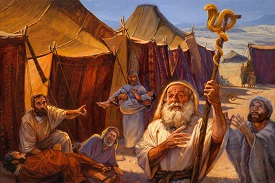 hey were quickly rescued, in order to keep them from forgetting you completely and depriving themselves of your kindness. ** By the seraph serpents. This refers back to
hey were quickly rescued, in order to keep them from forgetting you completely and depriving themselves of your kindness. ** By the seraph serpents. This refers back to  been telling the Church in Corinth about love and marriage. He counsels that whatever we do with regard to celibacy, abstinence, or matrimony, we should do it in, with, and for the Lord. He expressly says to consider carefully how to live with or without a spouse so that our devotion to Christ may be unhindered. I put a note there about the Greek word he used – ἀπερισπάστως (
been telling the Church in Corinth about love and marriage. He counsels that whatever we do with regard to celibacy, abstinence, or matrimony, we should do it in, with, and for the Lord. He expressly says to consider carefully how to live with or without a spouse so that our devotion to Christ may be unhindered. I put a note there about the Greek word he used – ἀπερισπάστως (
 make a turnaround in our lives, as this symbol represents permission to make that sort of reorientation. Let’s think about what this means for a moment. If I am in traffic and see this sign, I know it is permissible form me to cease going forward, to cross the center line dividing traffic flow, and to begin traveling in the opposite direction. Nowhere on this sign do we read, “When safe,” or “When appropriate,” “On green arrow only,” or even “When necessary.” We are left to use common sense to make this maneuver safely. We know to be careful when we do this because someone else in the oncoming traffic might not expect us to turn around. In The Kingdom of God, we are instructed to make a U-Turn regardless of the oncoming traffic. Now, as some of us know, that can still be a dangerous thing in some situations. Take the example of abusive relationships.
make a turnaround in our lives, as this symbol represents permission to make that sort of reorientation. Let’s think about what this means for a moment. If I am in traffic and see this sign, I know it is permissible form me to cease going forward, to cross the center line dividing traffic flow, and to begin traveling in the opposite direction. Nowhere on this sign do we read, “When safe,” or “When appropriate,” “On green arrow only,” or even “When necessary.” We are left to use common sense to make this maneuver safely. We know to be careful when we do this because someone else in the oncoming traffic might not expect us to turn around. In The Kingdom of God, we are instructed to make a U-Turn regardless of the oncoming traffic. Now, as some of us know, that can still be a dangerous thing in some situations. Take the example of abusive relationships.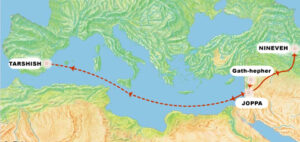 Jewish Prophet. He lived around 785 BC in the town of Gath-Hepher which was in the region of Galilee (Zebulun) not far from Nazareth. He got a call from the Lord to travel to Nineveh to warn them they God was going to destroy them because they were so evil. Nineveh was the capital city of Assyria, and the Assyrians were cruel oppressors of the Israelites. They ruled for nearly 1,900 years over the region from what we would today call Eurasia through the entire middle east, and over into Egypt. Check out
Jewish Prophet. He lived around 785 BC in the town of Gath-Hepher which was in the region of Galilee (Zebulun) not far from Nazareth. He got a call from the Lord to travel to Nineveh to warn them they God was going to destroy them because they were so evil. Nineveh was the capital city of Assyria, and the Assyrians were cruel oppressors of the Israelites. They ruled for nearly 1,900 years over the region from what we would today call Eurasia through the entire middle east, and over into Egypt. Check out 


 And so, at the end we have The Beginning, the Light at the Beginning of the Tunnel. Stand in the Light, Belovéd. It is there,
And so, at the end we have The Beginning, the Light at the Beginning of the Tunnel. Stand in the Light, Belovéd. It is there, 
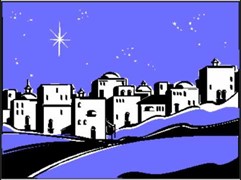
 Abraham in
Abraham in 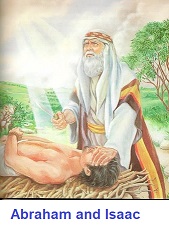 (25!) for that promise to be fulfilled. Then, around 12-13 years later, God asked Abraham to take Isaac to the top of Mount Moriah and to sacrifice him there as a burnt offering. Abraham took the lad up there. Abraham carried the knife and the fire; Isaac carried the wood (a prefiguring of the Way of the Cross). When Isaac asked his father, “Where is the lamb for the sacrifice?” Abraham replied, “The Lord will provide the sacrifice.” As he was about to put that knife to use on Isaac, the Angel of the Lord stopped him because there was a ram caught in a nearby thicket. Abraham called the place “The Lord will provide” (
(25!) for that promise to be fulfilled. Then, around 12-13 years later, God asked Abraham to take Isaac to the top of Mount Moriah and to sacrifice him there as a burnt offering. Abraham took the lad up there. Abraham carried the knife and the fire; Isaac carried the wood (a prefiguring of the Way of the Cross). When Isaac asked his father, “Where is the lamb for the sacrifice?” Abraham replied, “The Lord will provide the sacrifice.” As he was about to put that knife to use on Isaac, the Angel of the Lord stopped him because there was a ram caught in a nearby thicket. Abraham called the place “The Lord will provide” (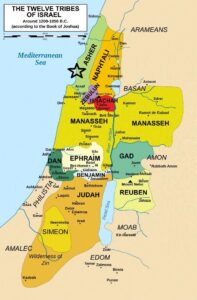 Now, let’s finish up with Anna, the prophetess, daughter of Phanuel of the tribe of Asher. (see the
Now, let’s finish up with Anna, the prophetess, daughter of Phanuel of the tribe of Asher. (see the 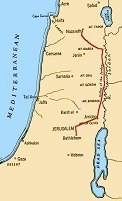 (Celebrated February 2, and also called “Candlemas”). Their “joint declaration” signifies that there is a New Covenant to be established, and this infant about whom they gush is the One Messiah they – and all of Israel – have watched for and waited for all these millennia. You see, a promise is a promise, and they believed in and SAW that promise fulfilled. Perhaps the folks who knew these two very old people shook their heads and clucked their tongues at the news they proclaimed. Maybe a few folks remembered the stories about shepherds around Bethlehem. The distance between Jerusalem and Bethlehem was about 6 miles, so the shepherds might have “come to town” bearing “tidings of great joy.” From Jerusalem to Nazareth was around 90 miles. Mary and Joseph had plenty of time to discuss things on the way back. Perhaps they stayed in Bethlehem with some of Joseph’s relatives for a time – long enough to be found by the Magi. We don’t know for sure, but we do know that God made a Prophecy he would “bring his son out of Egypt,” and that’s what happened when Herod ordered all the Innocents massacred.
(Celebrated February 2, and also called “Candlemas”). Their “joint declaration” signifies that there is a New Covenant to be established, and this infant about whom they gush is the One Messiah they – and all of Israel – have watched for and waited for all these millennia. You see, a promise is a promise, and they believed in and SAW that promise fulfilled. Perhaps the folks who knew these two very old people shook their heads and clucked their tongues at the news they proclaimed. Maybe a few folks remembered the stories about shepherds around Bethlehem. The distance between Jerusalem and Bethlehem was about 6 miles, so the shepherds might have “come to town” bearing “tidings of great joy.” From Jerusalem to Nazareth was around 90 miles. Mary and Joseph had plenty of time to discuss things on the way back. Perhaps they stayed in Bethlehem with some of Joseph’s relatives for a time – long enough to be found by the Magi. We don’t know for sure, but we do know that God made a Prophecy he would “bring his son out of Egypt,” and that’s what happened when Herod ordered all the Innocents massacred.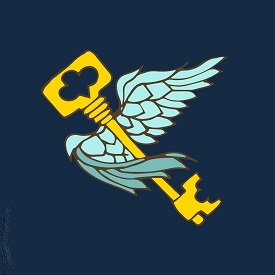
 has looked with favor on the lowliness of his servant. This is the beginning of the canticle often referred to as “The Magnificat.” Two definitions may be required here for some of our readers. What is a “canticle?” It is a song, like all the Psalms for example. “So, Chick, why isn’t it called a Psalm?” It is called a canticle because it is a song which is not included in the Book of Psalms in which all the song-poem named “Psalm” are recorded. There are canticles in Exodus, Deuteronomy, and 1 Samuel – the Song of the [Red] Sea, the Canticle of Moses, and the Canticle of Hannah respectively. You can find a nice list of Canticles in the Bible
has looked with favor on the lowliness of his servant. This is the beginning of the canticle often referred to as “The Magnificat.” Two definitions may be required here for some of our readers. What is a “canticle?” It is a song, like all the Psalms for example. “So, Chick, why isn’t it called a Psalm?” It is called a canticle because it is a song which is not included in the Book of Psalms in which all the song-poem named “Psalm” are recorded. There are canticles in Exodus, Deuteronomy, and 1 Samuel – the Song of the [Red] Sea, the Canticle of Moses, and the Canticle of Hannah respectively. You can find a nice list of Canticles in the Bible 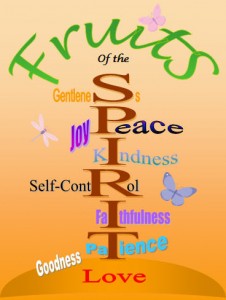 Spirit. All of the things mentioned as the Fruit of the Spirit are things that make us happy. We can find them in
Spirit. All of the things mentioned as the Fruit of the Spirit are things that make us happy. We can find them in 





